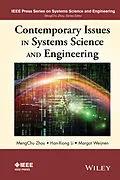Various systems science and engineering disciplines are covered and challenging new research issues in these disciplines are revealed. They will be extremely valuable for the readers to search for some new research directions and problems.
* Chapters are contributed by world-renowned systems engineers
* Chapters include discussions and conclusions
* Readers can grasp each event holistically without having professional expertise in the field
Autorentext
MengChu Zhou is a Distinguished Professor of Electrical and Computer Engineering at the New Jersey Institute of Technology (NJIT), USA. He is an Associate Editor of IEEE Transactions on Systems, Man, and Cybernetics: Systems, and is a fellow of IEEE, IFAC, and AAAS.
Han-Xiong Li is a Professor in the Department of Systems Science and Engineering and Engineering Management at the City University of Hong Kong, HK. Dr. Li Serves as an Associate Editor of IEEE Transactions on Cybernetics, and IEEE Transactions on Industrial Electronics. He is a Fellow of the IEEE.
Margot Weijnen is a full Professor of Process and Energy Systems Engineering at Delft University of Technology, the Netherlands. She is the founding and Scientific Director of Next Generation Infrastructures and, since 2013, a member of the Netherlands Scientific Council for Government Policy. She is a founding fellow of ISEAM and European editor of the Journal of Critical Infrastructures.Klappentext
This volume provides a comprehensive overview of all important areas in systems science and engineering and poses the issues and challenges in these areas in order to deal with ever-increasingly complex systems and newly emergent applications. The topics range from discrete event systems, distributed intelligent systems, grey systems, and enterprise information systems to conflict resolution, robotics and intelligent sensing, smart grids, and system of systems approaches. Individual chapters are written by leading experts in the field.
Additional features include:
- Presents multiple systems science and engineering topics in-depth
- Each section includes detailed problems, technical issues, and solution methodologies, illustrated with a series of significant examples
- Discusses important ideas for future research
Inhalt
Contributors xxiii
Preface xxix
I Systems Science are Engineering Methodologies 1
1 A Systems Framework For Sustainability 3
Ali G. Hessami, Feng Hsu, are Hamid Jahankhani
1.1 Introduction 3
1.2 A Unified Systems Sustainability Concept 5
1.3 Sustainability Assurance: the Framework 6
1.3.1 Weighted Factors Analysis 6
1.3.2 the Framework 7
1.3.3 the Macro Concept of a Sustainable Architecture (G4.1) 10
1.3.4 the Micro Concept of a Sustainable System 11
1.3.5 A Top-Down Hierarchy of a Multi-Level Sustainability Concept 12
1.4 Technological Sustainability Case StudyInformation Systems Security 13
1.4.1 Network Security as a Business Issue 14
1.4.2 the Focus of Investment on Network Security 15
1.5 Conclusions 17
References 18
2 System of Systems Thinking In Policy Development: Challenges are Opportunities 21
Keith W. Hipel, Liping Fang, are Michele Bristow
2.1 Introduction 21
2.1.1 A World in Crisis 21
2.1.2 System of Systems 23
2.2 Value Systems are Ethics 26
2.2.1 Conflicting Value Systems 27
2.2.2 Modeling Value Systems 28
2.3 Complex Adaptive Systems 32
2.3.1 Emergent Behavior 32
2.3.2 Modeling Complex Systems 34
2.4 Risk, Uncertainty, are Unpredictability 37
2.4.1 Risk Management 37
2.4.2 Modeling Risk are Adaptation Processes 40
2.5 System of Systems Modeling are Policy Development 42
2.5.1 Global Food System Model 43
2.5.2 Policy Implications 51
2.6 Conclusions 58
References 59
3 Systemic Yoyos: An Intuition are Playground For General Systems Research 71
Yi Lin, Yi Dongyun, are Zaiwu Gong
3.1 Introduction 71
3.1.1 the Concept of General Systems 72
3.1.2 A Look at the Success of Calculus-Based Theories 75
3.1.3 Whole Evolution are Yoyo Fields 78
3.2 Theoretical are Empirical Justifications 81
3.2.1 Transitional Changes in Whole Evolutions 81
3.2.2 Quantitative Infinity are Equal Quantitative Effects 83
3.2.3 Fluid Circulation, Informational Infrastructure, are Human Communications 86
3.3 Elementary Properties of Yoyo Fields 91
3.3.1 Eddy are Meridian Fields 91
3.3.2 Interactions Between Systemic Yoyos 94
3.3.3 Laws on State of Motion 98
3.4 Applications in Social Sciences 102
3.4.1 Systemic Structures of Civilizations 102
3.4.2 Systemic Structures Beneath Business Organizations 108
3.4.3 Systemic Structure in Human Mind 109
3.5 Applications in Economics 113
3.5.1 Becker's Rotten Kid Theorem 113
3.5.2 Interindustry Wage Differentials 117
3.5.3 Price Behaviors of Projects 122
3.6 Applications in the Foundations of Mathematics 127
3.6.1 Historical Crises in the Foundations of Mathematics 128
3.6.2 Actual are Potential Infinities 131
3.6.3 Vase Puzzle are the Fourth Crisis 132
3.7 Applications in Extreme Weather Forecast 137
3.7.1 V-3𝜃 Graphs: A Structural Prediction Method 137
3.7.2 Digitization of Irregular Information 140
3.8 Conclusions 143
References 146
4 Grey System: Thinking, Methods, are Models With Applications 153
Sifeng Liu, Jeffrey Y.L. Forrest, are Yingjie Yang 4.1 Introduction 153
4.1.1 Inception are Growth of Grey System Theory 153
4.1.2 Basics of Grey System 155
4.2 Sequence Operators 157
4.2.1 Buffer Operators 158
4.2.2 Generation of Grey Sequences 160
4.2.3 Exponentiality of Accumulating Generations 162
4.3 Grey Incidence Analysis 163
4.3.1 Grey Incidence Factors are Set of Grey Incidence Operators 163
4.3.2 Degrees of Grey Incidences 164
4.3....
